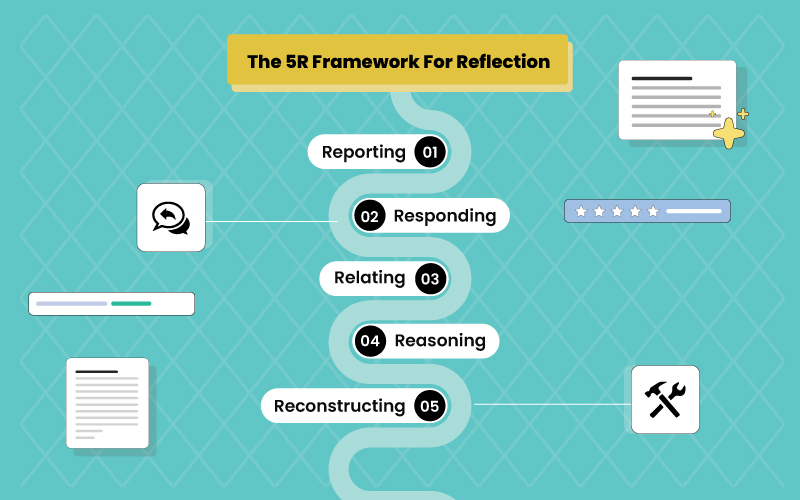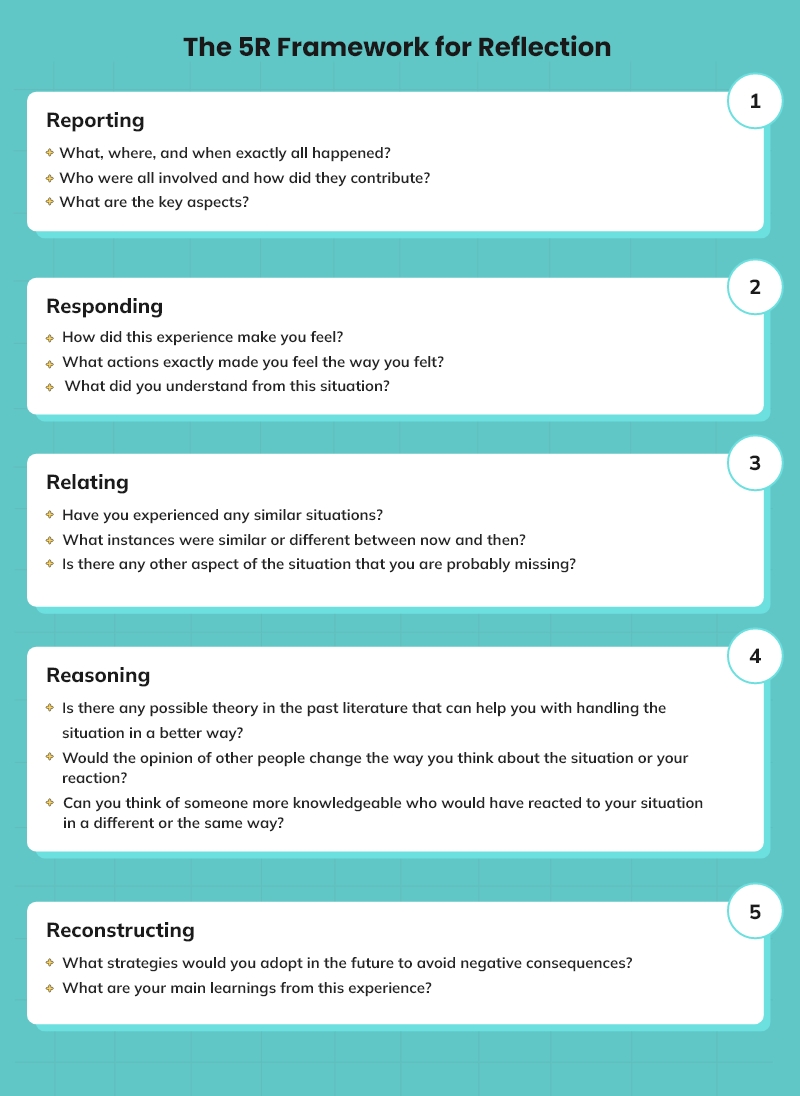
Overview
The 5R framework for reflection was developed by Bain et al. in 2002 and guides students and teachers in reflecting on their experiences. The 5R framework represents Reporting, Responding, Relating, Reasoning, and Reconstructing the experience to present it in an engaging reflection. Brian works to achieve two important purposes through this model
Table of Contents
- To support teachers and students in understanding what is involved in serious reflection.
- To enhance the ability of students and teachers to assess their reflective writing through the 5 levels of R proposed by Bain et al (Amhag, 2022).
Elaboration of 5Rs Framework
A detailed elaboration of the 5 R's along with essential questions that can assist you in reflective writing.
Stage 1: Reporting
Just like other reflection models, the very first R is reporting in which you will highlight the context of a situation you want to reflect upon. In this section, you have to make sure that you present the situation without any prior interpretation or assumption. Some assisting questions are
- What, where, and when exactly all happened?
In this section, you will highlight all the factual information about the occurrence of the incident on which you are reflecting upon. - Who were all involved and how did they contribute?
While answering this question, you will highlight the other factors like people or stances that were involved in the situation and their contribution to the situation. - What are the key aspects?
While answering this, you will highlight the involvement of other major aspects in the situation.
Stage 2: Responding
Second R is focused on your response. All your thoughts, feelings, and observations regarding the situation will be included in the second R. In short, this section is about the emotional aspect of the situation you want to reflect upon. A few assisting questions that can assist you in framing this section are mentioned below.
- How did this experience make you feel?
In this section, you will majorly focus on highlighting the feelings you felt throughout the experience. - What actions exactly made you feel the way you felt?
While answering this question, you will highlight the actions that contributed to making you feel the way you felt. - What did you understand from this situation?
In this, you will underline your whole understanding of the situation. For example, it can be your learning or your way of expressing the situation you are reflecting upon.

Stage 3: Relating
In this section, you will relate the experience to your external knowledge or any similar past experience that has occurred to you. Based on similar instances, you will underline and draw out the contrast between your skills and experience. Questions that can assist you are mentioned below.
- Have you experienced any similar situations?
While answering this question, you will highlight any past experience that you feel is similar to the experience you are reflecting on. - What instances were similar or different between now and then?
While telling your past experience, you will highlight the similarities or differences of both situations. - Is there any other aspect of the situation that you are probably missing?
In this, you will critically analyze the situation and will highlight whether you are missing any particular aspect of the situation or not.
Stage 4: Reasoning
In this second last R, you would try to connect all the explained dots till now and try to connect all the instances with logical reasoning of things that happened in a way that happened. All significant factors that impacted the way you reacted or responded will be covered in this aspect. A few relevant questions of the model are mentioned below.
- Is there any possible theory in the past literature that can help you with handling the situation in a better way?
In this, you will highlight the link of any theory you feel is relevant here that could have guided you for reacting in a better way. - Would the opinion of other people change the way you think about the situation or your reaction?
In this, you will highlight, the different ways in which other people’s opinion might have affected you reaction. - Can you think of someone more knowledgeable who would have reacted to your situation in a different or the same way?
While answering this, you would highlight a complete list of people who you think would have reacted the same way.
Stage 5: Reconstructing
In the last section, the last R covers an action plan for the future. In this section, you will meticulously explain all your learnings and observations. Further, you will include all your observations and learnings in the action plan you will prepare for the future to react in a similar situation. Moreover, when you decide on your actions, it will total justice do SMART goals you were trying to achieve in future experiences. Some aiding questions are
- What strategies would you adopt in the future to avoid negative consequences?
In this, you would highlight the different ways in which you will highlight the strategies that you will take to avoid negative consequences of your similar actions in the future. - What are your main learnings from this experience?
While answering this question, you will draw out your main learnings from the experience.
After the effective explanation of the model, the next section will be focusing on an example that will assist you in better understanding the model.
The 5R Framework for reflection Example
Case assessment - This is a reflective example of an intern reflecting upon her experience of working in an IT company. During her experience, the intern was facing an issue of proofreading and consulted the same to her supervisor.
I recently completed my graduation and I was supposed to complete a 3 months internship with an IT company. After the interview, I got hired at an IT company as an SEO content writer. I was confident about my writing skills but during 3 months of my internship, I faced challenges in proofreading. Due to a lack of concentration, I was not able to identify whether my written articles or blogs were grammatically error-free or not. But my senior was quite supportive and his support gave me the confidence of trying my best every time I felt a little low. Due to his constant support and motivation, I constantly kept myself determined to overcome the barrier of proofreading. Using different strategies and tactics, I ultimately improved my proofreading to some extent and completed my internship.
During my internship, I felt a little nervous and underconfident because of my efficiency issues. Even after trying so much from my end, I was having a hard time improving my proofreading skills. So, when I was facing the challenge of my efficiency issues, I decided to take some grammar lessons and listened to podcasts on how to improve my proofreading. Moreover, I communicated the issue I was facing with my project manager and asked for some tricks and tips from him to overcome my challenges. I believe that by taking these actions, I was feeling a little more confident because I was learning and improving my work. From this whole situation, I understood that it is really important to learn and adapt from the environment. These new learnings will help me in improving my efficiency as a content writer.
While I was on my internship, I realized that I have faced a similar situation during high school when I was supposed to submit essays. At that time also, my teachers used to point out that I lack concentration and that is the reason why I skip some errors that affect the overall quality of my essay. I probably think that I need to work on my concentration in order to improve my proofreading skills.
If I look at the situation precisely, I realize that the major reason behind my lack of concentration is that I get distracted easily. As there are many things going on around the cubicle where our team sits, I often get distracted and focus on things that do not matter or are not of my concern.I believe that if someone would have advised me from the very beginning that proofreading is an important part of content writing, then I would have definitely paid more attention to the proofreading right from the start. When I searched it out, I found that there is a Distraction-Conflict theory developed by Robert Baron in 1986 which related my situation to a similar level. To continue, the theory states that when an individual is performing a task in the mere presence of other individuals, it creates a conflict for the performer to focus on the task and focus on other aspects involved (Baron, 1986). After critically identifying my issue, I decided to involve my supervisor in the matter because I thought he was a knowledgeable person and would be able to guide me better in resolving the issue.
After effectively confronting my supervisor, I decided to eliminate the major cause of distraction and constructed an action plan of using earphones and playing loud music to avoid indulging any sort of distractions occurring around me. I strongly believe that this strategy would work if any situations similar occurred in the future. During my internship, I learned that I was vulnerable to distractions and I would never be able to avoid distractions but what I can do is eliminate the source of distractions every time a similar situation comes up. I firmly believe that this action plan will help me in preventing myself from landing into efficiency issues ever again in my life.
FAQs
Limitations of the 5R Framework of Reflection
The limitations of the 5R framework of reflection may include over-simplification as some learning experiences requires flexibility and might not fit into these 5 stages, another thing is the lack of guidance, as this method requires you to reflect upon your experiences. but, does not provide an in-depth analysis or a how-to for drawing such experiences.
What is the difference between the "Responding" and "Relating" stages?
The "Responding" stage focuses on exploring personal observations, feelings, and thoughts during the experience, while the "Relating" stage connects the experience to existing knowledge and skills.
Previous Model
Roper Logan & Tierney's modelNext Model
REFLECT Model Box 1References
Amhag, L. (2022). Student Reflections and Self-Assessments in Vocational Training Supported by a Mobile Learning Hub. Retrieved 14 August 2022.
Baron, R. (1986). Distraction-Conflict Theory: Progress and Problems. Advances In Experimental Social Psychology, 1-40. doi: 10.1016/s0065-2601(08)60211-7

 Proof Reading
Proof Reading  Copy Writing
Copy Writing  Resume Writing
Resume Writing  Blogs
Blogs Guides
Guides SOP's
SOP's Student Resources
Student Resources Research Topics
Research Topics Login
Login Register
Register